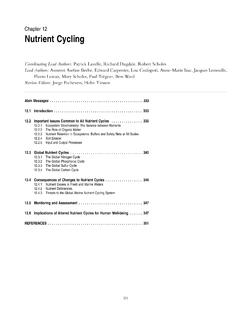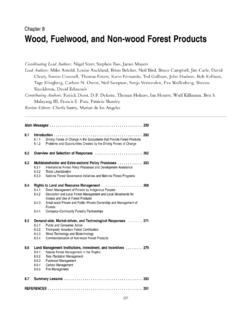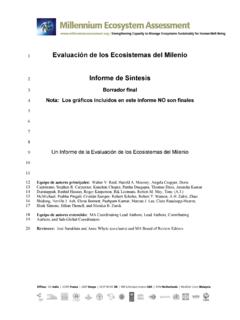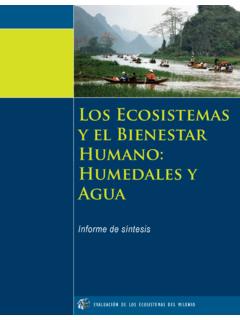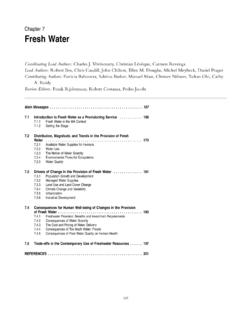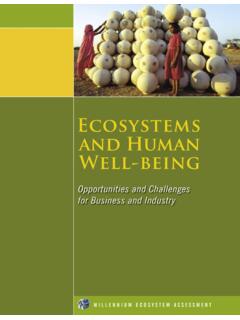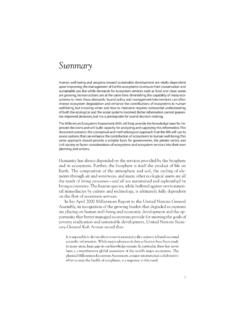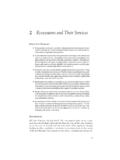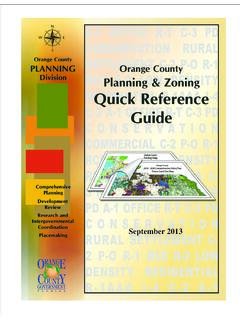Transcription of Ecosystems AND HUMAN WELL-BEING
1 Ecosystems and HUMAN WELL-BEING : D e s e r t i f i c a t i o n S y n t h e s i s 1 MILLENNIUM ECOSYSTEM ASSESSMENTD esertification SynthesisEcosystemsAND HUMAN well -BEINGMILLENNIUM ECOSYSTEM ASSESSMENTE cosystems and HUMAN WELL-BEING : D e s e r t i f i c a t i o n S y n t h e s i s2 Millennium Ecosystem Assessment PanelCo-chairsRobert T. Watson, Chief Scientist, The World Zakri, Director, Institute of Advanced Studies, United Nations UniversityInstitutional RepresentativesSalvatore Arico, Programme Officer, Division of Ecological and Earth Sciences, United Nations Educational, Scientific and Cultural OrganizationPeter Bridgewater, Secretary General, Ramsar Convention on WetlandsHama Arba Diallo, Executive Secretary, United Nations Convention to Combat DesertificationAdel El-Beltagy, Director General, International Center for Agricultural Research in Dry Areas, Consultative Group on International Agricultural ResearchMax Finlayson, Chair, Scien-tific and Technical Review Panel, Ramsar Convention on WetlandsColin Galbraith, Chair.
2 Scientific Council, Convention on Migratory SpeciesErika Harms, Senior Program Officer for Biodiversity, United Nations FoundationRobert Hepworth, Acting Executive Secretary, Convention on Migratory SpeciesOlav Kj rven, Director, Energy and Environment Group, United Nations Development ProgrammeKerstin Leitner, Assistant Director-General, Sustainable Development and Healthy Environments, World Health OrganizationAlfred Oteng-Yeboah, Chair, Subsidiary Body on Scientific, Technical and Techno-logical Advice, Convention on Biological DiversityChristian Prip, Chair, Subsidiary Body on Scientific, Technical and Technological Advice, Convention on Biological DiversityMario A. Ramos, Biodiversity Program Manager, Global Environment Facility Thomas Rosswall, Executive Director, International Council for Science - ICSUA chim Steiner, Director General, IUCN - The World Conservation UnionHalldor Thorgeirsson, Coordinator, United Nations Framework Convention on Climate ChangeKlaus T pfer, Executive Director, United Nations Environment ProgrammeJeff Tschirley, Chief, Environmental and Natural Resources Service, Research, Extension and Training Division, Food and Agriculture Organiza-tion of the United NationsRiccardo Valentini, Chair, Committee on Science and Technology, United Nations Convention to Combat DesertificationHamdallah Zedan, Executive Secretary.
3 Convention on Biological Diversity At-large MembersFernando Almeida, Executive President, Business Council for Sustainable Development-BrazilPhoebe Barnard, Global Invasive Species Programme, South AfricaGordana Beltram, Undersecretary, Ministry of the Environment and Spatial Planning, SloveniaDelmar Blasco, Former Secretary General, Ramsar Convention on Wetlands, SpainAntony Burgmans, Chairman, Unilever , NetherlandsEsther Camac-Ramirez, Asociaci n Ix Ca Va de Desarrollo e Informaci n Indigena, Costa RicaAngela Cropper (ex officio), President, The Cropper Founda-tion, Trinidad and TobagoPartha Dasgupta, Professor, Faculty of Economics and Politics, University of Cambridge, United KingdomJos Mar a Figueres, Fundaci n Costa Rica para el Desarrollo Sostenible, Costa RicaFred Fortier, Indigenous Peoples Biodiversity Information Network, CanadaMohamed Hassan, Executive Director, Third World Academy of Sciences for the Developing World, ItalyJonathan Lash, President, World Resources Institute, United StatesWangari Maathai, Vice Minister for Environment, Kenya Paul Maro, Professor, Department of Geography, University of Dar es Salaam, TanzaniaHarold A.
4 Mooney (ex officio), Professor, Department of Biological Sciences, Stanford University, United StatesMarina Motovilova, Faculty of Geography, Laboratory of Moscow Region, Prasad, Environment Centre of the Kerala Sastra Sahitya Parishad, India Walter V. Reid, Director, Millennium Ecosystem Assessment, Malaysia and United StatesHenry Schacht, Past Chairman of the board , Lucent Technologies, United StatesPeter Johan Schei, Director, The Fridtjof Nansen Institute, NorwayIsmail Serageldin, President, Bibliotheca Alexandrina, EgyptDavid Suzuki, Chair, David Suzuki Foundation, Swaminathan, Chairman, MS Swaminathan Research Foundation, IndiaJos Gal zia Tundisi, President, International Institute of Ecology, BrazilAxel Wenblad, Vice President Environmental Affairs, Skanska AB, SwedenXu Guanhua, Minister, Ministry of Science and Technology, ChinaMuhammad Yunus, Managing Director, Grameen Bank.
5 BangladeshMillennium Ecosystem Assessment BoardThe MA board represents the users of the findings of the MA A. Mooney (co-chair), Stanford University, United StatesAngela Cropper (co-chair), The Cropper Foundation, Trinidad and TobagoDoris Capistrano, Center for Inter-national Forestry Research, IndonesiaStephen R. Carpenter, University of Wisconsin-Madison, United StatesKanchan Chopra, Institute of Economic Growth, IndiaPartha Dasgupta, University of Cambridge, United KingdomRashid Hassan, University of Pretoria, South AfricaRik Leemans, Wageningen University, NetherlandsRobert M. May, University of Oxford, United KingdomPrabhu Pingali, Food and Agriculture Organization of the United Nations, ItalyCristi n Samper, Smithsonian National Museum of Natural History, United StatesRobert Scholes, Council for Scientific and Industrial Research, South AfricaRobert T.
6 Watson, The World Bank, United States (ex officio)A. H. Zakri, United Nations University, Japan (ex officio)Zhao Shidong, Chinese Academy of Sciences, ChinaJos Sarukh n, Universidad Nacio-nal Aut noma de M xico, MexicoAnne Whyte, Mestor Associates Ltd., CanadaWalter V. Reid, Millennium Ecosystem Assessment, Malaysia and United StatesEditorial board ChairsMA DirectorEcosystems and HUMAN WELL-BEING Desertification SynthesisA Report of the Millennium Ecosystem AssessmentCore Writing TeamZafar Adeel, Uriel Safriel, David Niemeijer, and Robin WhiteExtended Writing TeamGr goire de Kalbermatten, Michael Glantz, Boshra Salem, Bob Scholes, Maryam Niamir-Fuller, Simeon Ehui, and Valentine Yapi-GnaoreReview EditorsJos Sarukh n and Anne Whyte (co-chairs) and MA board of Review Editors Suggested citation:Millennium Ecosystem Assessment, 2005.
7 Ecosystems and HUMAN WELL-BEING : Desertification Synthesis. World Resources Institute, Washington, 2005 World Resources InstituteAll rights reserved under International and Pan-American Copyright Conventions. No part of this book may be reproduced in any form or by any means without permission in writing from the publisher: World Resources Institute, 10 G Street NE, Suite 800, Washington, DC of Congress Cataloging-in-Publication data. Ecosystems and HUMAN WELL-BEING : desertification synthesis : a report of the millennium ecosystem assessment / core writing team, Zafar Adeel .. [et al.]. p. cm. Includes bibliographical references and index. ISBN 1-56973-590-5 (alk. paper) 1. Sustainable development. 2.
8 Desertification. I. Adeel, Zafar. 2005 6--dc22 2005015614 Printed on recycled, acid-free paperBook design by Dever DesignsManufactured in the United States of AmericaForeword iiPreface iiiReader s Guide ivSummary for Decision-makers 1 Key Questions on Desertification in the Millennium Ecosystem Assessment 3 1. How is desertification related to ecosystem services and HUMAN WELL-BEING ? 4 Interlinkages 4 Manifestations of Desertification 6 2. Who is affected by desertification? 7 Geographical Extent of Desertification 7 Poverty and Vulnerability of the Affected Population 7 Regional and Global Consequences of Desertification beyond Drylands 8 3. What are the major causes of desertification?
9 9 Social, Economic, and Policy Factors 9 Globalization Phenomena 9 Land Use Patterns and Practices 10 4. How will different future development paths affect desertification? 11 Scenarios Approach 11 Key Findings from the MA Scenarios 12 Key Challenges for the Future 13 5. How can we prevent or reverse desertification? 14 Rationale 14 Prevention 14 Reversal of Land Degradation 16 6. What are the linkages among desertification, global climate change, and biodiversity loss? 17 7. How can we better understand the significance of desertification? 19 Monitoring, Baseline Development, and Assessment 19 Reducing Uncertainty 21 Appendix A. Present-day Drylands and Their Categories 23 Appendix B.
10 Abbreviations and Acronyms 24 Appendix C. Assessment Report Tables of Contents 25 ContentsEcosystems and HUMAN WELL-BEING : D e s e r t i f i c a t i o n S y n t h e s i siiForewordDesertification is a concept used to grasp the more acute forms of the degradation of land-based Ecosystems and the consequences of the loss of their services. Drought is the silent killer the natural catastrophe that is only too easily forgotten. Experience shows that awareness of the implications of desertification and drought must be expanded and that policy orientation must be backed by robust monitoring systems and related findings. The Millennium Ecosystem Assessment has made a significant and much appreciated contribution to this end.
